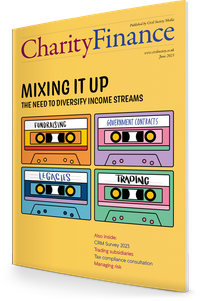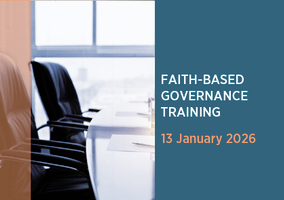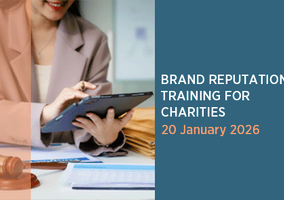Beyond compliance – Building tomorrow’s sector today
We are delighted to announce the return of our ESG Imperative conference.
There is a growing awareness that organisations of all shapes and sizes have a personal accountability to consider their social and environmental footprint and to behave responsibly. But what does this really look like? How many of the reporting frameworks and strategies being adopted in other sectors are transferable to charities?
From navigating the complex world of responsible investment, through to developing net zero targets and tackling the complexities of reporting and good governance, there is a myriad of practical and ethical decisions facing today’s leaders. Our broad range of speakers will offer practical insight and advice, demonstrating the importance and urgency of the ESG agenda, and leaving you better equipped to take meaningful action. We hope you will join us for what promises to be an inspiring, practical and thought-leading conference.
Programme
12 February 2025
-
8.45AM - 9.25AMRegistration, refreshments, networking and time to visit exhibition
-
9.25AM - 9.30AMWelcome from Tristan Blythe, editor, Charity Finance
-
9.30AM - 10.10AMOpening keynote: The future we want – aligning charity leadership with the UN’s global goals
This opening session will consider the significance of the UN’s Sustainable Development Goals (SDGs) for us as charity leaders. No matter your organisation’s core mission, our sector is fundamentally about addressing inequalities, alleviating suffering, and building
more resilient communities – all core elements of the SDGs. Operating in the context of economic instability, social polarisation and an escalating climate crisis, effective leadership today means recognising the interconnectedness of people, prosperity, and the planet.
Richard Hawkes draws on an extensive career in charity leadership to reflect on how the dial has changed, and why leading with the SDGs as our guiding compass could offer a fresh and hopeful perspective for global progress.
Richard Hawkes, chief executive, British Asian Trust
-
10.15AM - 10.55AM1A. Weaving ESG thinking into the fabric of your organisationWould you accept a grant from an oil producer but exclude them from your investment portfolio, or use a bank that would lend
to firm with a poor human rights record? Trustees, beneficiaries and commentators are increasingly focused on ensuring that a
charity’s policies align, but it’s easier said than done. Join LGT and CAF Bank as we share our insights and look to explore your views
on this evolving topic.Speakers: Laurence Gagen, partner, head of charities, LGT Wealth Management and Scott Newman, regional director, south, CAF Bank -
10.15AM - 10.55AM1B. The ‘S’ in ESG – The quest for unity in a polarised societyWhen we think about ESG, it is often the environmental and governance elements that gain most traction. However, in the wake of last summer’s far right riots, social issues are becoming more critical. We are witnessing growing polarisation in attitudes towards immigration, increasing economic insecurity, and an erosion of trust in politicians, all of which are being exacerbated by the media narrative. In this session we will discuss the opportunities for our sector to use our collective influence to dismantle prejudice and tackle disunity.
Bilal Hussain, head of engagement, Runnymede Trust -
10.55AM - 11.20AMMorning coffee and networking
-
11.20AM - 12.00PM2A. Revisiting your ESG foundations - is it time to reevaluate?
The face of RI is continuously evolving. While many charities, as society's change makers, were first movers incorporating ESG considerations into their thinking, are your policies still fit for your objectives? Are you struck, like so many, with hindsight concerns? Are internal changes to your charity's structure, activities or board encouraging you to reevaluate? This session will delve into the changing influencers in responsible investing today and how charities might incorporate new thinking.
Katrina Brown, head of responsible investment and Caroline Gee, head of charity business development, Evelyn Partners
-
11.20AM - 12.00PM2B. From ambition to action – practical pathways to net zero
The Church of England has committed to an ambitious goal to achieve net zero carbon by 2030 across its extensive portfolio of over 32,000 buildings. The nine-year net zero programme is currently in the development phase, which runs until 2025, and the Church is experimenting with diverse approaches to sustainability including funding mechanisms, distributed decision-making and mobilising local communities. Join this session to learn more about the Net Zero Carbon Routemap and gain practical advice on how to transition from ambitious goals to actionable steps to change.
Julian Atkins, net zero programme director, Church of England Environment Programme
-
12.05PM - 12.50PMPanel: why wait for the regulation?
The current Statement of Recommended Practice (SORP) lacks explicit requirements for environmental impact and sustainability reporting. However, there is a possibility that forthcoming updates to the guidance could include some aspects of ESG reporting for larger
charities. In this session, we invite some non-environmental charities that are taking a proactive approach to ESG, EDI and climate action, to explain a little about what they are doing and why, regardless of reporting requirements.Panellists: Ben Clarkson, chief finance and operating officer, Parkinson's UK, Mandeep Rupra, director of equity and belonging, Citizens Advice, Shazia Arshad, head of communications, Islamic Relief UK, Sophie Brill, head of ethics, Oxfam GB
-
12.50PM - 1.45PMLunch and time to visit exhibition
-
1.45PM - 2.25PM3A. Antimicrobial resistance – why should investors care?
Antimicrobial resistance (AMR) is a systemic risk, just like climate change. Ask any healthcare professional what they consider to be the greatest risk to modern medicine, and the vast majority will respond, the lack of new antibiotics. In this session, Maria Ortino, director of investment stewardship at Legal & General, will explore the topic of AMR and why investors should take note. Maria will be joined by Romane Thomas, the investment manager, equities & sustainability at Trinity College Cambridge to give her insightful perspective as an asset owner, in what promises to be an important and insightful discussion.
Maria Ortino, director of investment stewardship, Legal & General Investment Management and Romane Thomas, investment manager, equities & sustainability, Trinity College Cambridge
-
1.45PM - 2.25PM3B. Power rewired - addressing inequity in grant and investment funding
This session focuses on addressing power imbalances in social investment and grant funding. The recipients of funding are often best placed to determine the most effective way to combat a particular social or environmental issue, due to lived experience or long-standing expertise, but recipients’ strategy and resource allocation can become constrained by (sometimes inadvertently) prescriptive or onerous funder requirements and legal processes. Sung-Hyui Park and Emma Clague of Bates Wells will share insights from the “Equalising Deal Terms” project, highlighting challenges faced by investees and research on power dynamics. The session will also offer practical steps to help funders and recipients navigate these issues while ensuring funders comply with charity law obligations.
Emma Clague, solicitor and Sung-Hyui Park, partner, Bates Wells
-
2.30PM - 3.10PM4A. Sustainable Private Assets: Accessing strong returns with positive impact
We are seeing an increasing number of our charity clients looking to incorporate impact investments whether as a separate 'carve out' or as a direction of travel for the whole portfolio to align their investments with positive societal and environmental outcomes. Many of the most exciting companies that have the ability to transform our economies are only accessible through private (unlisted) markets. It is therefore no surprise that the private impact market has grown 63% since 2019 (Global Impact Investing Network) and the UK market is set to double over the next five years (Impact Investing Institute). Access is now improving for long-term investors and this session will cover the why, what, who and how of investing in sustainable private assets.
Speakers TBC, Cazenove Capital
-
2.30PM - 3.10PM4B. Understanding your foundation's past: A journey toward greater impact
This session invites you to explore how examining the origins of foundation wealth, with particular refence to exploitation of people and planet, can transform relationships with communities and deepen social impact. Learn about foundations that have undertaken this journey, discovering how confronting connections to historical exploitation, such as enslavement of people, has strengthened their mission and enhanced their effectiveness. Rowena Estwick brings first-hand foundation experience and Catherine Seymour developed the Association of Charitable Foundations' practical toolkit for addressing wealth origins. Together they will share insights and strategies that can help your foundation build trust through transparency and take meaningful steps toward justice.
Speakers: Rowena Estwick, co-chief executive, Ten Years’ Time and Catherine Seymour, director of policy, practice and research, Association of Charitable Foundations
-
3.10PM - 3.30PMAfternoon coffee and networking
-
3.30PM - 4.10PM5A. Shaping your investment portfolio today for a net zero tomorrow
What does a truly sustainable, net zero portfolio look like, and how can charities get there? With many organisations committing to be net zero from their operations by 2030 and from their investment portfolios by 2040 or 2050, the clock is ticking. While these targets may seem far off, the actions we take in portfolios today are the key to meeting these ambitious goals. In this session, we’ll dive into the critical frameworks for creating a net zero portfolio and explore the latest tools for assessing companies and strategies for effective engagement.
Christophe Borysiewicz, investment director, Rathbones
-
3.30PM - 4.10PM5B. How AI is shaping the future of sustainability analysis
ESG factors are widely acknowledged as being critical to the long-term risk management of portfolios. However, with little to no regulatory requirements or standardised tools, it is difficult for charities to assess the ESG performance of their portfolio. This session will explain how the latest developments in Artificial Intelligence (AI) are revolutionising the speed and accuracy of sustainability analysis, driving efficiencies and increasing transparency. Join to learn more about how charities could leverage this technology to gain a deeper understanding of their investment portfolio, benchmarking and tracking ESG performance, and actively managing risk in order to ensure their investments align with their mission.
Speaker(s) from GaiaLens
-
4.15PM - 5.00PMClosing Panel: The good, the bad and the benefactor – debating ethics in donations and corporate partnerships
The Charity Commission’s latest guidance for trustees asserts that their default position should be to accept donations offered to their organisations, ensuring personal biases don’t cloud decision-making. However, trustees also have the discretion to refuse or return
donations when it’s in the charity’s best interest. This creates a complex grey area: while corporate partnerships and philanthropy are vital funding sources, they often come with ethical dilemmas and reputational risks. Join us to explore the moral, practical, and reputational
challenges facing charities navigating the complexities of corporate giving. Should trustees prioritise financial sustainability, or does the integrity of their cause demand a stricter ethical stance? Let’s discuss where the line should be drawn – and who should decide.Panellists: Stephanie Hensen Dittmer, development director, Royal Shakespeare Company, Chris Sherwood, chief executive designate, NSPCC, Emily Thomas, global associate director of philanthropy, ClientEarth, Michael Terwey, chair of the ethics committee, Museums Association, Paul Latham, director of communications and policy, Charity Commission
-
5.10PM - 6.10PMNetworking drinks reception
ESG is a Net-Zero Event
As event organisers, we at Civil Society Media are on our own journey to a sustainable future. We have calculated the carbon footprint of this event and implemented several measures to reduce it, including:
- Offering a fully vegetarian menu throughout the day.
- Selecting a venue which is the first and only royal college to achieve
- The Carbon Trust Standard, the world’s leading independent certification of an organisation’s achievements in reducing environmental impact.
- Going paperless—our event app will provide the programme, presentations, and delegate list, replacing traditional printed materials.
- Using fully recyclable badges—please hand in your badge and lanyard at the end of the day so they can be recycled and reused.
We are continually working to monitor and reduce our environmental impact. We have offset the remaining emissions of this event by investing in a carbon offset scheme. We have partnered with an ICROA-accredited organisation, ensuring that only certified carbon offsets from internationally recognised registries are used to meet the highest standards of environmental integrity. Civil Society Media has chosen to support the Mataven Jungle Indigenous Guardianship Project which protects biodiversity and preserves cultural heritage in Columbia.
What is ESG?

First produced in June's issue of Charity Finance
While social care charities are, by definition, providing a solution to a social issue, like the rest of the charity sector many are increasingly aware of wider environmental, social and governance (ESG) issues too.
ESG reporting is becoming an important focus for many charities, but the exact definition of the term remains relatively unclear. It can be helpful to consider what each of the letters in this acronym means.
- Environmental: the narrative around the environmental aspect has become associated with climate change, net-zero carbon emissions, and the energy transition, and could arguably be broadened to include wider social and physical aspects of the environment, such as dignity and wellbeing, or biodiversity and conservation.
- Social: social encompasses ethical behaviour and practices towards staff and beneficiaries, and the wider contribution to the sustainability of the socio-economic framework.
- Governance: governance encompasses control and direction, with a focus on the way a charity sets out to address risks and opportunities.
ESG as an opportunity for charities
ESG reporting provides an opportunity to tell a charity’s story about its part in the movement towards a sustainable future. Meaningful, authentic ESG reporting can be moulded around each charity’s ethos and values. The other spectrum of ESG has been the initiatives driven by the passions of the charity’s beneficiaries and staff alike to create eco-initiatives and lead on new policies. Reporting on ESG, rather than being a tick-box exercise, could be an opportunity to evaluate what more can be done.
Increasing public benefit
Another consideration for ESG reporting is the work charities do regarding public benefit reporting. In England and Wales, trustees must confirm that they have applied the Charity Commission’s guidance on public benefit. Public benefit is seen to be part of the social aspect of ESG. When thinking about how to include the governance aspect within reporting, the Charities SORP provides guidance to those preparing charity accounts.
While the SORP does not expressly consider ESG reporting, aspects of its existing requirements do coincide with elements of ESG. Similarly, the Charity Governance Code (2020) encourages elements of ESG.
How can charities report on ESG?
There has been a noticeable drive towards greener activity, meaning ESG has climbed up the agenda. Currently, there is no watchdog or regulator offering support for organisations adapting their practices to become more sustainable. This makes it difficult for many charities to see how they can implement ESG reporting practically and in a meaningful way.
The Charity Commission has previously engaged with ESG reporting and the guidance is typically supportive of sustainability being incorporated into the charity’s approach, provided it aligns or is complementary to, the charity’s overall objectives. The two are also linked, with ethical considerations having a positive effect on public trust. The SORP Committee identified sustainability reporting as part of their discussions for developing the SORP.
Further hurdles
While there are lessons to be learned from current corporate reporting, they are by no means always best practice. More weight needs to be placed on the social and governance aspects of ESG, rather than the current focus on the environmental one. The nature of many charities means that ESG can be inherent, but consideration still needs to be given to issues such as employment and safeguarding.
As well as the resourcing issue, ESG reporting might create challenges around who takes responsibility for collecting the information. If reporting lies within the annual report, finance teams could already be struggling for capacity, so charities may need to consider which system would work best for them.
Looking forward
There are currently three options available to charities:
- Do something new.
- Imitate existing reporting.
- Let sleeping dogs lie.
However, keeping an eye on future plans and the impact on the wider community is key.
Importantly, we need to stress that charities are already likely to be doing more than they think and it is a matter of teasing out the relevant aspects for reporting. The way this is communicated, whether through websites or annual reports, is also an important consideration.
Lee Stokes is partner and head of care & community at haysmacintyre
Prices
Great ways to save!
- Be an early bird!
Book your place now to save up to £150 off the ticket price. - Attend with your team!
Ensure your whole team benefits from a great day's learning. With the Charity Team Ticket you can send up to four people
| Ticket type | Early-bird (before 17 January) | Final release tickets (after 17 January) | |
| Charity Finance subscriber rate | £79 | £149 | |
| Charity delegate | £99 | £169 | |
| Charity team ticket (up to four places) **Limited quantity available** |
£249 | £460 |
Contact
For sponsorship and exhibition queries contact Yvette Micallef
For speaker queries contact our events team
For registration queries contact Carys Pugh
For media partnerships and marketing queries contact Kirsty Brown
Terms and conditions
- Payment
- Registrations will not be fully confirmed until correct payment is received. If you have any issues with payment, please contact [email protected]
- Programming
- Please note that speakers and topics were confirmed at the time of publishing, however, circumstances beyond the control of the organisers may necessitate substitutions, alterations or cancellations of the speakers and/or topics. As such Civil Society Media Ltd reserves the right to alter or modify the advertised speakers and/or topics if necessary. Any substitutions or alterations will be updated on our web page as soon as possible.
- Event attendance
- Delegates are required to observe and comply with all laws, regulations, rules and requirements relating to COVID-19 and which Civil Society Media has adopted as part of its operations. Civil Society Media will communicate the COVID-19 Measures to you from time to time including and without limitation via pre-Event emails, its social channels and the event website
- Civil Society Media reserves the right to alter or remove its COVID-19 Measures at any time in response to the latest guidance or legislation from the UK Government or as otherwise deemed necessary by Civil Society Media in its discretion.
- Civil Society Media reserves the right to eject you or refuse you entry from the event if, in our reasonable opinion, you are refusing to comply with any COVID-19 Measures without reasonable grounds.
- Cancellation or reimbursement
- On receipt of your booking form, your place is confirmed. Delegate substitutions are allowed. Refunds on cancellations will only be issued (less a 15% administration charge) up to and including 30 days prior to the event. Refunds will not be issued after this date. Confirmation of cancellations MUST be in writing and sent to [email protected]
- Individual registrants who registered as part of a discounted group registration are not eligible for refunds, unless the entire group cancels. Registrations may be transferred to another person from the same organisation at any time.
- Postponement or Cancellation of the Event by the Organiser
- Should we have to cancel or postpone due to COVID-19 we will endeavour to give you as much notice as is reasonably possible.
- In the event that we have to postpone this event due to COVID-19, we will transfer your ticket to the next alternative date.































